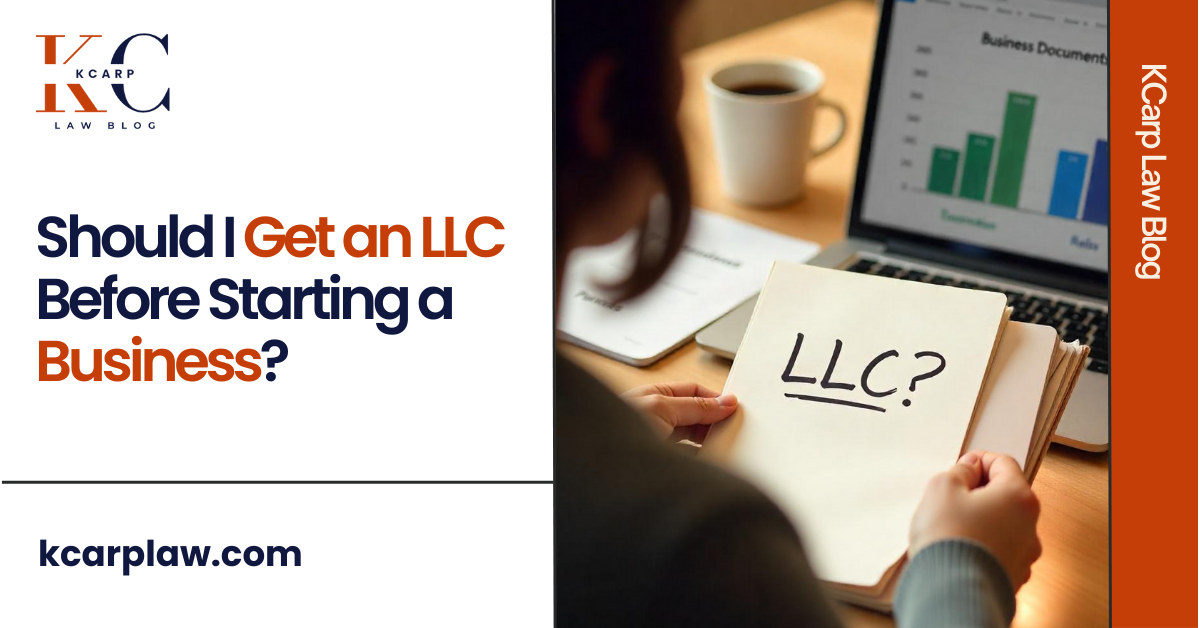Forming an LLC before starting a business is not legally required, but many entrepreneurs do it for protection and peace of mind. It’s natural to wonder if the associated costs and paperwork are worthwhile. The short answer depends on your situation, including potential risks, projected growth, and financial considerations.
Some people choose to begin their operations as sole proprietors and wait until they see a proven market. Others prefer to set up an LLC right away to safeguard personal assets if the business runs into legal or financial issues. Below, we’ll explore how an LLC works, its pros and cons, and what you need to consider before you decide.
What Is an LLC and How Does It Work?
An LLC (Limited Liability Company) is a separate legal entity that protects its owners (called “members”) from personal liability for the business’s debts or lawsuits. Put simply, if your LLC is sued, only the business’s assets are at risk—your personal home or savings are generally off-limits.
LLCs typically receive pass-through taxation by default, meaning any profits or losses are reported on the members’ personal tax returns. This structure differs from a sole proprietorship, which has no legal separation between the owner and the business. Forming an LLC does require some paperwork and filing fees, but it creates a valuable shield for your personal finances.
What Are the Benefits of Forming an LLC Early?
Limited Liability
Limited liability is the primary advantage of an LLC. Because your company is treated as a distinct entity, only the business’s assets are usually at risk in lawsuits or unpaid debts. This separation, sometimes called the “corporate veil,” helps keep personal assets like your home and savings off the table.
Tax Flexibility
By default, an LLC is taxed much like a sole proprietor or partnership, allowing pass-through taxes and avoiding corporate tax at the entity level. If your business grows, you can later elect S-Corp or C-Corp status for potential tax savings. This flexibility is useful if you expect your income and expenses to change over time.
Credibility and Professionalism
Having “LLC” in your business name can make a strong first impression. Even small or home-based businesses often benefit from the perceived legitimacy of an LLC. Prospective clients may see you as more established than a casual sole proprietorship.
Simple Management
LLCs generally have fewer administrative requirements than corporations. You don’t need a board of directors or formal annual shareholder meetings. Instead, an LLC lets you define your management structure, making day-to-day operations less rigid.
Capital and Growth (Briefly)
While an LLC can’t go public like a corporation, it still accommodates multiple owners and can be converted into a corporation later. This approach suits startups that might need significant fundraising down the road but aren’t at that stage yet.
What Are the Drawbacks or Costs of Forming an LLC Early?
State Fees and Paperwork
Each state charges a filing fee to form an LLC, and there may be ongoing costs, like an annual franchise tax or required reports. This can be a burden if you’re not yet earning much revenue. Remaining a sole proprietor means avoiding those state fees, at least in the beginning.
Formal Requirements
LLCs require some official filings: typically Articles of Organization and an Operating Agreement. You must also keep personal and business finances distinctly separate. Failing to observe these formalities could lead a court to “pierce the corporate veil,” putting your personal assets at risk.
Complexity for Very Simple Start
If your business idea is extremely low-risk—perhaps a small side hustle—you may see forming an LLC as extra hassle. It’s fine to start lean as a sole proprietor and switch to an LLC once you have consistent revenue or bigger liabilities to protect against.
Possible Tax Downsides
By default, LLC members pay self-employment tax on all profits. For some, that’s not a big change from operating as a sole proprietor. But if you elect C-corp status, you could face corporate taxes and more administrative steps. Weigh these issues to decide if an LLC is financially sensible for you.
How Does an LLC Compare to Sole Proprietorships and Corporations?
LLC vs. Sole Proprietorship
A sole proprietorship is the simplest way to start a business, with no separate filings or fees. However, there’s also no liability protection—if your business faces legal trouble, your personal assets are completely exposed. An LLC, in contrast, keeps the owner’s finances separate from the business’s liabilities.
LLC vs. Corporation (Inc.)
C-corporations typically provide strong liability protection but face double taxation on profits (at the corporate level and again on shareholder dividends). LLCs can avoid that double taxation by default and generally feature fewer formal requirements. For many small businesses, an LLC strikes a good balance between liability protection and simplicity.
LLC vs. Partnerships/Independent Contractors
Traditional partnerships share profits and losses but don’t automatically provide liability protection. If you and a partner want clear liability separation, forming an LLC can be a prudent move. For solo freelancers, forming an LLC is often compared to remaining a sole prop, with liability protection as the main motivator.
LLC vs. S-Corp Election
An LLC can later elect S-corporation status to reduce self-employment taxes on part of its income. This step usually makes sense once profits are high enough to justify the extra payroll and accounting steps. You can stick with the LLC default at first and consider an S-corp election if and when it becomes beneficial.
Who Should Consider Forming an LLC at Startup?
New Entrepreneurs and Small Businesses
LLCs work well for most small to midsize businesses with a well-defined plan. If you own assets you want to protect, or you predict a moderate or significant level of risk, an LLC may be your best bet from the outset.
Freelancers and Independent Contractors
Anyone providing services—consultants, designers, gig workers—can benefit from an LLC’s liability separation. You don’t always need one to freelance, but if you’re signing contracts or could face disputes, an LLC can help shield your personal finances.
Local or Niche Small Businesses
Physical storefronts, contractors, or food services often involve liability risks like customer injuries, accidents, or product defects. Forming an LLC means those liabilities primarily affect the business rather than your personal property.
Other Scenarios
Entrepreneurs who plan to raise capital, own rental properties, or have multiple members often benefit from an LLC’s clear ownership structure. Even if you might want to become a corporation later, starting with an LLC is frequently simpler and easier.
When Is the Right Time to Form an LLC?
Not Required Immediately
You can absolutely start operating as a sole proprietor, then form an LLC later. You simply won’t have liability protection until the LLC is officially recognized by your state. Some business owners choose to wait until they confirm their idea is viable or worth significant investment.
Factors for Early Formation
If you’re signing contracts, hiring employees, or working in an area that could bring lawsuits, forming an LLC from day one is often wise. This also applies if you want to project a professional image right away.
Waiting to Test the Business
If you’re still validating a side project or new product, it may make sense to hold off. Once you see real demand, you can file the LLC and shift your operations under that formal structure. Just remember you’re at personal risk during any gap where you haven’t formed an LLC yet.
Consult with Professionals
Rules and fees vary by state, and the best timing differs for each person. An accountant or lawyer can explain how an LLC might affect your unique financial or legal situation. Ultimately, forming early can safeguard you, but not everyone wants to pay the fees if the venture is purely experimental.
What Factors Should I Consider When Deciding?
Personal Liability Risk
Think about how exposed you’d be if a customer lawsuit or contract dispute occurs. High-risk industries lean toward forming an LLC early.
Business Complexity
More owners or plans for investors make an LLC useful, as it sets formal ownership shares and management roles.
Financial and Tax Situation
Some states impose annual franchise taxes that might not be worth it for low-earning side hustles. On the flip side, pass-through taxation or an S-corp election can benefit profitable ventures.
Long-Term Goals
Planning to grow, hire employees, or sell? An LLC lets you convert to a corporation later if needed. Starting with an LLC can ease that transition.
Timing and Stage of Business
If you’re still brainstorming, waiting can save you fees. If you’re already taking on obligations, an LLC might be the safer choice.
Trust and Credibility
Clients often see an LLC as more legitimate. This can matter if you’re bidding for bigger contracts or want to attract investors.
How Do I Form an LLC? (Step-by-Step)
Choose a Name
Pick a unique name that meets state guidelines, typically including “LLC.” Verify availability in your state’s business name database.
File Formation Documents
Prepare “Articles of Organization” (sometimes called a Certificate of Formation) and submit them to your state’s filing office. Expect a fee, often a few hundred dollars, varying by location.
Designate a Registered Agent
This person or service will accept legal documents on behalf of your LLC. You can act as your own or pay a professional agent.
Create an Operating Agreement
Though not always required by law, this document defines ownership stakes, decision-making rules, and procedures. It’s especially valuable for multi-member LLCs, but even solo owners benefit from having a clear structure on record.
Get an EIN
Obtain an EIN (Employer Identification Number) from the IRS, even if you have no employees. It’s commonly needed to open a separate business bank account.
Register for Taxes and Licenses
If your line of work requires specific permits or you’ll collect sales tax, register with the relevant state or local agencies. Requirements vary based on your industry and location.
Maintain Corporate Formalities
Open a separate bank account, track business finances, and follow any annual or biennial reporting rules your state enforces. This consistent record-keeping preserves the LLC’s liability protection.
Should I Consult a Lawyer Before Forming My LLC?
When to Seek Legal Help
You can handle an LLC on your own, but an attorney is helpful for tailoring details to your situation, especially if multiple owners or unique agreements are involved. Legal guidance ensures your documents meet your exact business needs.
Compliance Assurance
A lawyer can confirm you’ve met all state requirements. They can also advise on any industry-specific licensing rules or annual obligations, helping you avoid mistakes that might jeopardize your liability shield.
Tax Structure Advice
Lawyers and CPAs can guide you on whether to remain with default taxation or elect S-corp or C-corp status. If you anticipate significant profits or specific write-offs, professional input can save money in the long run.
Peace of Mind
It’s normal to feel overwhelmed by legal decisions at the start of a business. A short consultation can clarify your options, provide personalized assurance, and help you confidently move forward with your LLC formation.
In the end, deciding whether to form an LLC before you start often hinges on how much risk you’re willing to accept, how you plan to grow, and how you want to present your business. Taking care of it early can offer powerful asset protection and a credibility boost. If you’re unsure, getting legal or financial advice can help you make the best decision for your unique circumstances.

